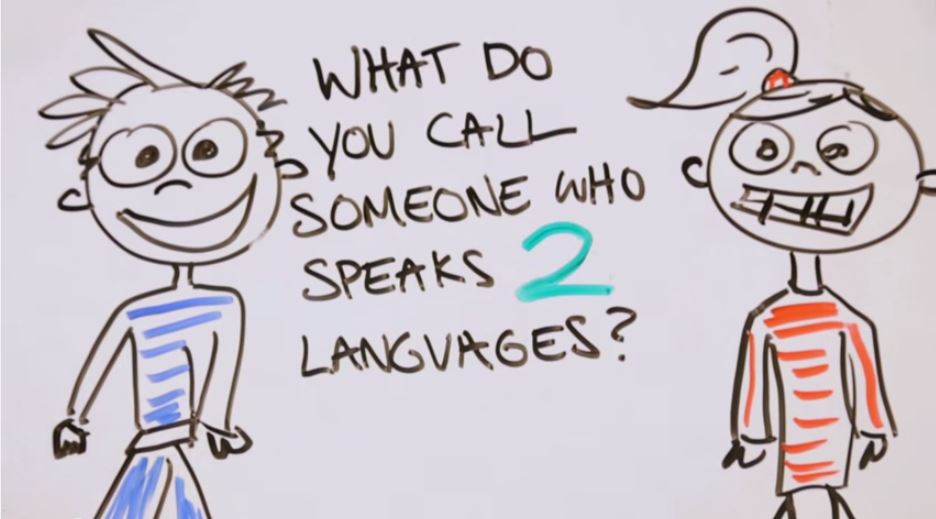Being bilingual boosts brain power and sparks creativity!
Posted on December 4th, 2014
It’s been a while ever since –as the story goes– “God” destroyed the Tower of Babel and gave each man a different language, but every day seems to bring us closer to a new Tower of Babel – that is, globalization.
Long gone are the times when a civilization could grow and prosper on its own. Most of our modern science –both natural and social– may have been conceived in the Nineteenth Century Western World but today, the most innovative robots are being made in Japan while India is at the forefront in the field of Anthropology. One little idea can rise from a single mind in some small corner of the world and the next thing you know, another guy from another small corner of it will turn this little idea into the next game changer.
English is today’s lingua-franca and, let’s be honest, is likely to remain as such for a long, long time. On the other hand, my experiences as both an expat and traveller have shown me that wherever you go, locals will always appreciate any effort you’ll put into speaking their language. Trying to learn the language is viewed by most as a true sign of good faith when it comes to integrating a community. At the same time, more and more is done by governments and organizations to preserve local variants and minority languages.
So paradoxically, the emergence of a global lingua-franca coexists with a growing fondness for languages-diversity. Knowing English is first and foremost a matter of being practical, if only because 55,7% of the whole internet is written in English (just to give you an idea, the next 2 languages used online, Russian and German, represent only 6% each!). Knowing a couple of other languages may be more useful is some very specific fields (see how business students from all over the world are now rushing into Chinese courses) but more importantly, is viewed as a sign of sophistication and being open-minded. And if you ask me, both sophistication and being open-minded DO have a future (it’s the Age of Aquarius after all, ain’t it?).
That’s when the benefit of multilingual education comes in. I’m not saying just bilingual, but multilingual. Because that’s what you get when a school provides at least 2 different languages while a third one at least is spoken at home. The multiple benefits of being bilingual or multilingual have been demonstrated countless times by cognition and linguistic experts ever since the 1960’s. I’m not going to go through a comprehensive listing of such advantages, you can just google the subject and you’ll find enough literature to keep you busy ‘til Christmas (that is, Christmas of 2015!). I’ll just gladly quote this very beautiful sentence by Ellen Bialystok and Kenji Hakuta, from their book In Other Words: “the knowledge of two languages is greater than the sum of its parts”.
Where I’d like to add a maybe more personal view on the subject is when it comes to the way being introduced to a new language shapes our very perception and understanding of the world around us. Language is not just a mean to communicate; it is first of all a way to conceptualize the world. The way you name and define things and concepts as well as the way you organize them together to shape sentences is all but meaningless. I’ve experienced this first hand as a learner of English, French and Italian. Despite their relative closeness to German, my mother tongue, each of those languages opened some doors to some new conceptual visions of reality. Just look at how English likes to go straight to the point while French likes to flirt with ideas in the most elaborated way. This little “detail” tells us more than you’d think about how native English and French speakers understand the world and act upon it than you’d know. None of these “ways” is necessarily better than the other, both are complementary and a kid that grows up equally exposed to both will most likely be able to take the best of both worlds! Not everyone is lucky enough to have bilingual parents, but anyone can be kind enough to put their own kids in a bilingual or multilingual school. “God” knows I wish I had been so lucky: as you know I’m a lawyer by training, and if any kind of language needs to use specific words for specific concepts it’s the language of Law: you’d better mean what you say and say what you mean or shut up till the end of times! So when I first had to plunge in the ocean of English legal semantics, so different and just as subtle as German law semantics, I’m pretty sure a better trained brain, a brain that’d have been more able to reconcile the many ways many things can be conveyed in so many different ways would have helped me a great deal. So take my word for it! Among the countless gifts parents can offer their kids, a multilingual school is a hell of a priceless one!
It’s priceless not just because of the aforementioned cognitive advantages or the obvious business perspectives it offers, it’s priceless because it helps unlocking the mind from the jail of narrowness. A child who’s being exposed to several languages is –by definition– exposed to several cultures, i.e. several conceptual interpretations of reality. This means an adult that’ll be less hasty to fall into the traps of being judgmental about what they don’t understand. And even though proof by anecdote isn’t proof at all, there’s a very personal experience I’d like to share with y’all here: it’s about my own, beloved son. When he first came to India after spending the first 10 years of his life speaking only German in Germany, he couldn’t find enough words to condemn his new home or, truth be told, every possible thing that existed outside of his very little familiar world. In the course of the last 2 years he has become a near-fluent English speaker and he’s shared his school time with kids from all over the planet. You should see how he’s grown away from prejudice unto such a curious, eager to learn individual.
In the end he was not living with an Indian foster family and despite my knowledge of the world I was still his German father speaking German to him at home, so for what it’s worth, my take is that he owes a lot of this new “mentality” to the fact that his brain’s had to absorb a new way to “speak the world” as well as being around kids whose perceptions of it radically differed from his on some accounts – kids he had to fraternize with nonetheless, and find way to befriend despite language and cultural barriers.
The way a second language has penetrated his mind and changed him for the best and forever, this is something that German public schools –despite their numerous qualities– couldn’t have allowed, this is something only a bilingual school could allow. And you know what? Now he’s learning French as well. If nothing else, I’m pretty sure this will help him improve his table manners! ☺
They say many drops make a river. Well, the more drops the better when it comes to the river that’s our children’s minds!
Click the below picture and check the video about Bilingualism.










